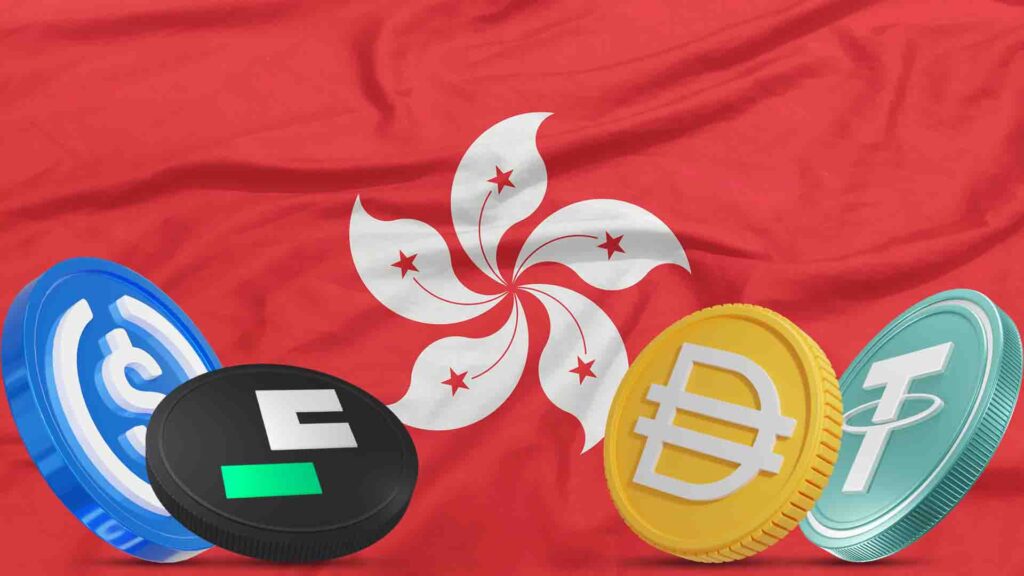Hong Kong To Enforce Stablecoin Law with Full Backing In August 1

Key Insights:
- All stablecoins in Hong Kong must be fully backed by cash or government bonds.
- Issuers must obtain a Hong Kong Monetary Authority license starting August 1.
- Major players like Standard Chartered and JD.com prepare to launch compliant stablecoins.
Hong Kong will enforce new stablecoin regulations starting August 1. Fiat-backed tokens must be fully backed by real assets and issued by licensed firms. The law will increase trust, provide financial stability, and turn the city into a regulated crypto hub.
Stablecoin Rules Set to Reshape Hong Kong’s Digital Finance Landscape
On August 1, Hong Kong will implement its new stablecoin ordinance. This would create a licensing regime under the Hong Kong Monetary Authority (HKMA).
The law applies to all stablecoins pegged to fiat currencies. Issuers must prove full backing with liquid and reliable assets like cash or short-term government bonds. Hong Kong is among the first major Asian jurisdictions to mandate 1:1 asset backing for stablecoins.
This requirement ensures legal compliance and financial security. It establishes a strict but stable framework for digital currencies.
The Legislative Council passed the legislation on May 21. It applies to stablecoins pegged to the Hong Kong dollar and any fiat-backed tokens issued in the city. Stablecoin issuers must be licensed, and the HKMA will oversee everything.
Firms must follow rules such as transparency reporting and regular audits. Redemption mechanisms will help protect consumers and maintain price stability. Therefore, the city is taking a big step towards integrating virtual assets with conventional finance under strong supervision.
Industry experts say the clear regulatory structure provides legal certainty for fintech firms, institutional investors, and startups. Hong Kong wants to become a digital asset hub by meeting the global demand for regulated and reliable stablecoins.
The law also prevents financial disruptions resulting from unbacked or poorly managed digital tokens. This led to user losses and wider market volatility in the past.
Global Context and Industry Momentum Around Stablecoin Adoption
The global stablecoin market has exploded in recent years, with a market capitalization of more than $230 billion in mid-2025. Countries and financial regulators are addressing weak reserve systems or a lack of accountability.
Hong Kong’s regulation is similar to the European Union’s MiCA framework and Singapore’s reserve rules. This also requires full backing and strict oversight of stablecoins.
While the United States is still debating the GENIUS Act, Hong Kong has already taken action and set a clear timeline. The city’s regulatory approach focuses on fiat-backed stablecoins and places responsibility on licensed issuers, reducing market uncertainty.
The new framework has already attracted the interest of major financial institutions. Stablecoins are being prepared for issue by Standard Chartered and JD.com’s Coinlink subsidiary under the HKMA’s supervision.
The participation also shows growing confidence in Hong Kong’s licensing model. This could attract more global firms. The momentum could help Hong Kong become a strategic hub for cross-border digital payments across Asia.
Opportunities and Challenges for Issuers and Cross-Border Trade
It also paves the way for faster, cheaper payment systems that can benefit small and medium-sized enterprises. Stablecoins backed by reliable reserves can streamline cross-border transactions. This primarily benefits trade with regions like southern China and Southeast Asia.
However, regulation is a double-edged sword; while it increases security and legitimacy, it can burden smaller issuers through compliance costs.
Strict reserve and transparency requirements may lead to market participation by larger, well-capitalized entities. But regulators say that putting financial stability and investor protection first trumps any short-term curbs on competition.
The law is expected to be rigorously enforced by the HKMA, which would only allow qualified firms to issue stablecoins. Companies must meet strict governance, operations, and liquidity management criteria to issue a Hong Kong dollar or US dollar stablecoin.
Meanwhile, some economists say the framework could also form the basis of offshore yuan stablecoins if Beijing approves. This could boost China’s currency profile in the global arena.




